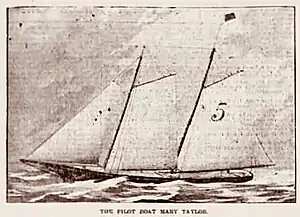 New York pilot boat Mary Taylor | |
| History | |
|---|---|
| Name | Mary Taylor |
| Namesake | Mary Taylor, popular New York actress |
| Owner | New York Pilots |
| Operator | Captain Richard Brown |
| Builder | Hathorne & Steers shipyard |
| Launched | 1849 |
| Out of service | November 10, 1863 |
| Fate | Sank at sea on November 10, 1863 |
| General characteristics | |
| Class and type | schooner |
| Tonnage | 75-tons TM[1]: p72 |
| Length | 67 ft 0 in (20.42 m) |
| Beam | 17 ft 10 in (5.44 m) |
| Depth | 7 ft 9 in (2.36 m) |
| Propulsion | Sail |
The Mary Taylor was a 19th-century yacht and Sandy Hook pilot boat, built at the Hathorne & Steers shipyard in 1849 for Captain Richard Brown. She was designed by George Steers with a new radical design with a long thin bow and wide stern, which made her faster than any other boat in her class. This design proved successful and led to the famous yacht America, which won the America's Cup in 1851. The Mary Taylor sank after colliding with the schooner Fairhaven in 1863. She was replaced by the Mary E. Fish.
Construction and service

New York pilot boat Mary Taylor, was built in early 1849 at the Hathorne & Steers shipyard, at the foot of North First street, in Williamsburg, New York.[2] She was designed by George Steers for Captain Richard "Dick" Brown. Steers designed her with a new thin bow and wide stern, which made her faster than any boat of her size. Fitting with the new design, Brown named her after a scandalous New York actress Mary Taylor, known for dancing the bawdy polka. The schooner was a big success, out sailing other boats in the pilot fleet.[1][3] The Mary Taylor was followed the next year by the Moses H. Grinnell, which led to the famous yacht America, which won the America's Cup.[4]
The following is from Steers about the Mary Taylor:
When George Steers laid the keel of the pilot boat, Mary Taylor, he engaged in advance to make a faster and steadier craft that had ever left the port of New York, and he succeeded exactly according to expectation. For encountering less resistance from the narrow bows, the vessel went faster, experienced no corresponding strain, and suffered no more in the storm than in the breeze.[2][5]
The sail number "5" was painted as a large number on the mainsail identified the boat as belonging to the Sandy Hook Pilots. Based on this number, the Mary Taylor No. 5, appeared in several prominent newspapers from 1849 to 1863. She was gaff rigged, two-masted schooner, 67 feet long; 17.10 feet beam; and 7.9 feet in depth.[1]: p72 Without the success of the Mary Taylor, the America may not have been built.[6]
A half model of the Mary Taylor's starboard side was made in 1849 by George Steers. The model is a representation of the boats's molded lines with a long thin bow and plum stern. Inscribed in black letters are the words "MARY TAYLOR."[7]
End of service
On November 10, 1863, the U. S. steam transport Fairhaven, came into collision with the Mary Taylor, No. 5, near Barnegat, New Jersey causing her to sink. A crew of six on board were saved.[8][9]: p23 [1]
See also
References
- 1 2 3 4 Cunliffe, Tom (2001). Pilots, The World Of Pilotage Under Sail and Oar. Brooklin, Maine: Wooden Boat Publications. p. 72. ISBN 9780937822692.
- 1 2 Neblett, Thomas R. (2009). Civil War Yacht. Mustang, Oklahoma: Tate Publishing & Enterprises. pp. 36–45.
- ↑ "Museum Exhibition Commemorates Yacht Races For America's Cup". New York Daily Tribune. New York, New York. 28 May 1850. Retrieved 2020-12-03 – via Newspapers.com.
- ↑ Russell, Charles Edward (1929). From Sandy Hook to 62°. New York: Century Co. pp. 94–95. OCLC 3804485.
- ↑ William Ross Wallace, 1860, The Loved and the Lost, "An American Shipbuilder." New York.
- ↑ "Was An Experimental America. The Mary Taylor, Pilot Boat Designed by George Steers, Proceeded the Famous Cup Winner by a Year, and Contained All the Elements of Design That Made the America Fast-Her Great Influence on American Yachting". The Boston Globe. Boston, Massachusetts. 17 Jul 1904. p. 53. Retrieved 2020-12-03 – via Newspapers.com.
- ↑ "MARY TAYLOR, NO. 5, NEW JERSEY PILOT SCHOONER". The Mariners' Museum and Park. 1848. Retrieved 2021-03-13.
- ↑ "Yesterday's Dispatches". Buffalo Courier. Buffalo, New York. 11 Nov 1863. p. 1. Retrieved 2020-12-03 – via Newspapers.com.
- ↑ Allen, Edward L. (1922). Pilot Lore From sail to Steam. New York: The United New York and New Jersey Sandy Hook Pilots Benevolent Associations. p. 22.